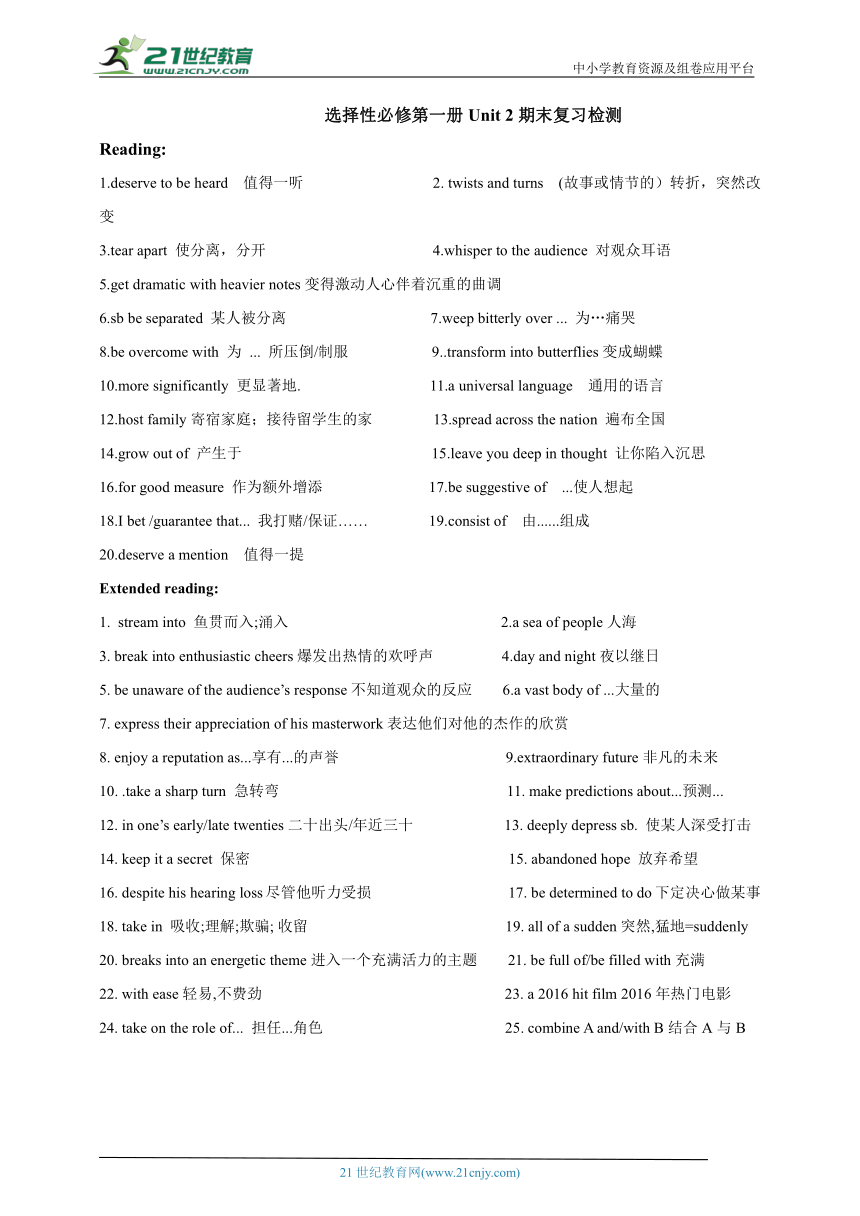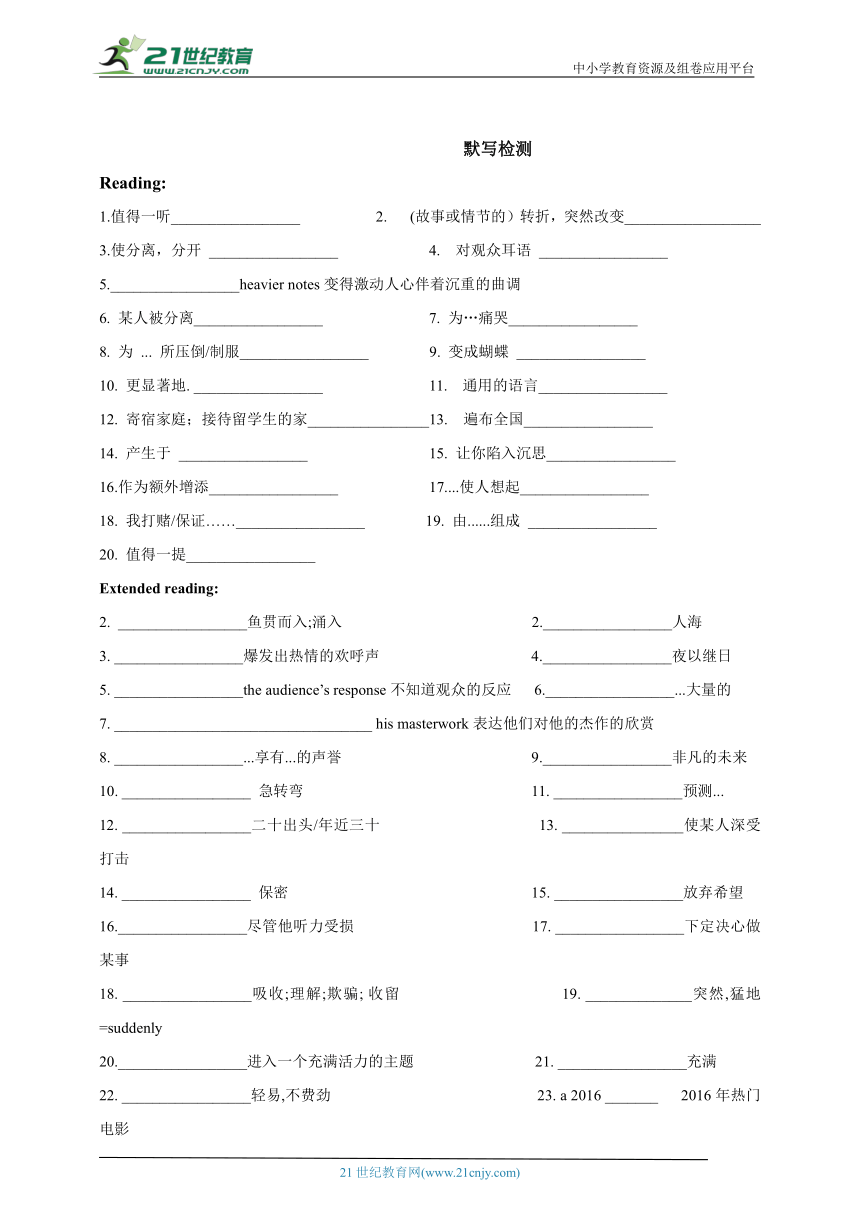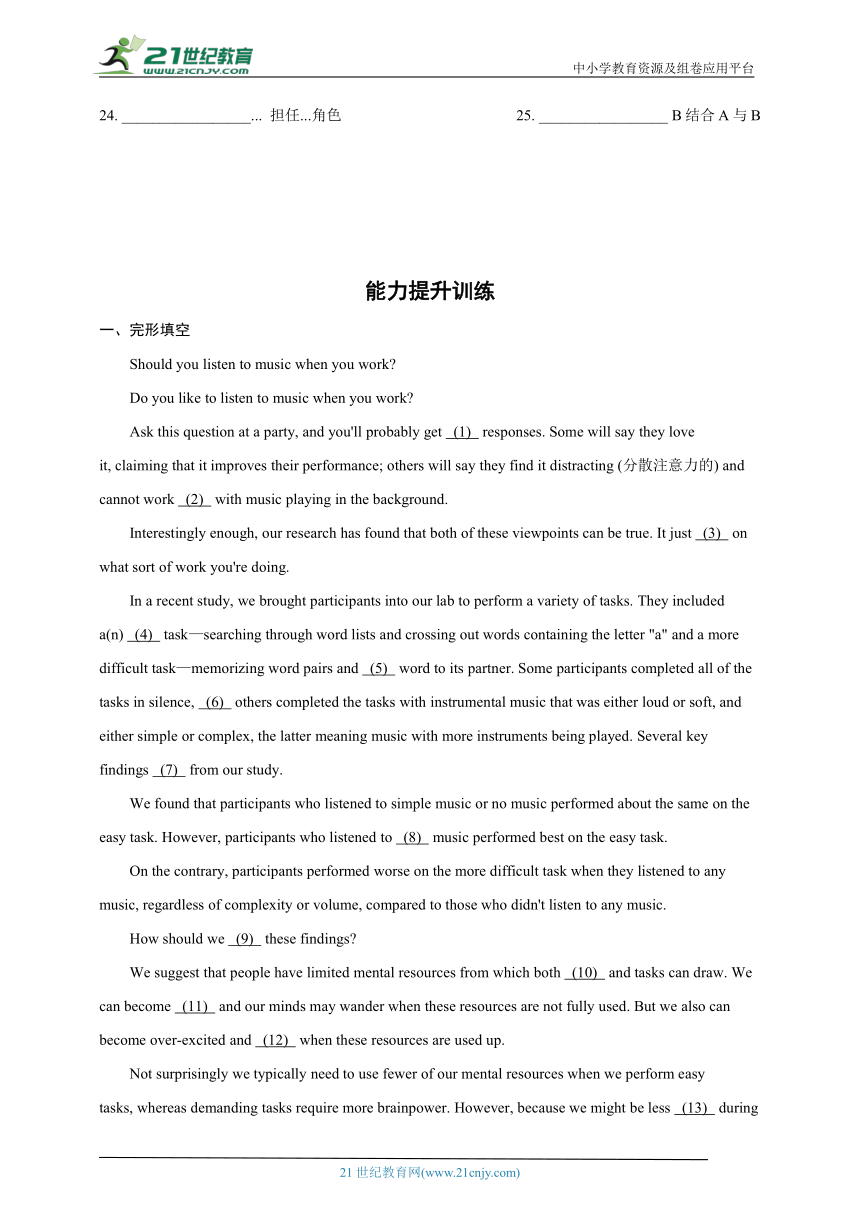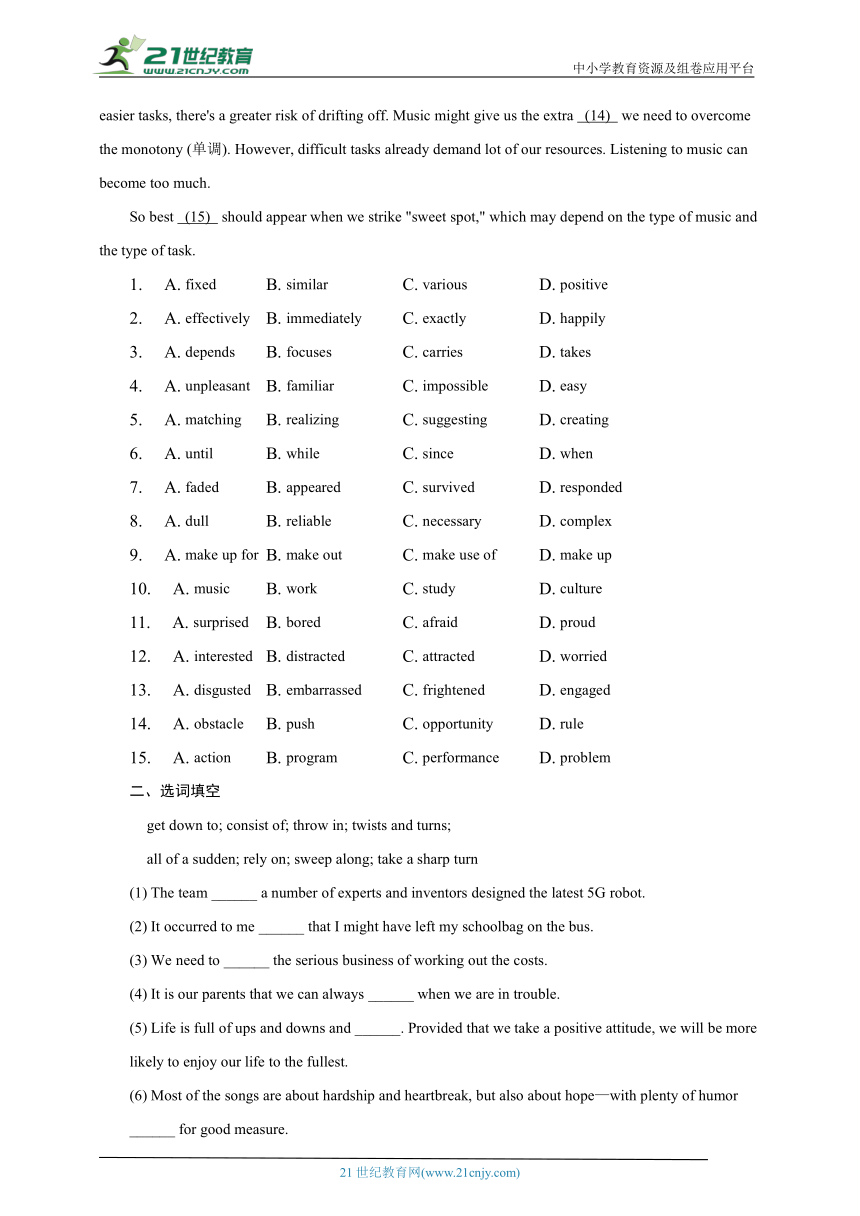选择性必修第一册Unit 2期末复习检测 含答案与解析
文档属性
| 名称 | 选择性必修第一册Unit 2期末复习检测 含答案与解析 |  | |
| 格式 | doc | ||
| 文件大小 | 1.2MB | ||
| 资源类型 | 试卷 | ||
| 版本资源 | 牛津译林版(2019) | ||
| 科目 | 英语 | ||
| 更新时间 | 2023-05-31 14:54:47 | ||
图片预览




文档简介
中小学教育资源及组卷应用平台
选择性必修第一册Unit 2期末复习检测
Reading:
1.deserve to be heard 值得一听 2. twists and turns (故事或情节的)转折,突然改变
3.tear apart 使分离,分开 4.whisper to the audience 对观众耳语
5.get dramatic with heavier notes变得激动人心伴着沉重的曲调
6.sb be separated 某人被分离 7.weep bitterly over ... 为…痛哭
8.be overcome with 为 ... 所压倒/制服 9..transform into butterflies变成蝴蝶
10.more significantly 更显著地. 11.a universal language 通用的语言
12.host family寄宿家庭;接待留学生的家 13.spread across the nation 遍布全国
14.grow out of 产生于 15.leave you deep in thought 让你陷入沉思
16.for good measure 作为额外增添 17.be suggestive of ...使人想起
18.I bet /guarantee that... 我打赌/保证…… 19.consist of 由......组成
20.deserve a mention 值得一提
Extended reading:
stream into 鱼贯而入;涌入 2.a sea of people人海
3. break into enthusiastic cheers爆发出热情的欢呼声 4.day and night夜以继日
5. be unaware of the audience’s response不知道观众的反应 6.a vast body of ...大量的
7. express their appreciation of his masterwork表达他们对他的杰作的欣赏
8. enjoy a reputation as...享有...的声誉 9.extraordinary future非凡的未来
10. .take a sharp turn 急转弯 11. make predictions about...预测...
12. in one’s early/late twenties二十出头/年近三十 13. deeply depress sb. 使某人深受打击
14. keep it a secret 保密 15. abandoned hope 放弃希望
16. despite his hearing loss尽管他听力受损 17. be determined to do下定决心做某事
18. take in 吸收;理解;欺骗; 收留 19. all of a sudden突然,猛地=suddenly
20. breaks into an energetic theme进入一个充满活力的主题 21. be full of/be filled with充满
22. with ease轻易,不费劲 23. a 2016 hit film 2016年热门电影
24. take on the role of... 担任...角色 bine A and/with B结合A与B
默写检测
Reading:
1.值得一听_________________ 2. (故事或情节的)转折,突然改变__________________
3.使分离,分开 _________________ 4. 对观众耳语 _________________
5._________________heavier notes变得激动人心伴着沉重的曲调
6. 某人被分离_________________ 7. 为…痛哭_________________
8. 为 ... 所压倒/制服_________________ 9. 变成蝴蝶 _________________
10. 更显著地. _________________ 11. 通用的语言_________________
12. 寄宿家庭;接待留学生的家________________13. 遍布全国_________________
14. 产生于 _________________ 15. 让你陷入沉思_________________
16.作为额外增添_________________ 17....使人想起_________________
18. 我打赌/保证……_________________ 19. 由......组成 _________________
20. 值得一提_________________
Extended reading:
_________________鱼贯而入;涌入 2._________________人海
3. _________________爆发出热情的欢呼声 4._________________夜以继日
5. _________________the audience’s response不知道观众的反应 6._________________...大量的
7. __________________________________ his masterwork表达他们对他的杰作的欣赏
8. _________________...享有...的声誉 9._________________非凡的未来
10. _________________ 急转弯 11. _________________预测...
12. _________________二十出头/年近三十 13. ________________使某人深受打击
14. _________________ 保密 15. _________________放弃希望
16._________________尽管他听力受损 17. _________________下定决心做某事
18. _________________吸收;理解;欺骗; 收留 19. ______________突然,猛地=suddenly
20._________________进入一个充满活力的主题 21. _________________充满
22. _________________轻易,不费劲 23. a 2016 _______ 2016年热门电影
24. _________________... 担任...角色 25. _________________ B结合A与B
能力提升训练
一、完形填空
Should you listen to music when you work
Do you like to listen to music when you work
Ask this question at a party, and you'll probably get (1) responses. Some will say they love it, claiming that it improves their performance; others will say they find it distracting (分散注意力的) and cannot work (2) with music playing in the background.
Interestingly enough, our research has found that both of these viewpoints can be true. It just (3) on what sort of work you're doing.
In a recent study, we brought participants into our lab to perform a variety of tasks. They included a(n) (4) task—searching through word lists and crossing out words containing the letter "a" and a more difficult task—memorizing word pairs and (5) word to its partner. Some participants completed all of the tasks in silence, (6) others completed the tasks with instrumental music that was either loud or soft, and either simple or complex, the latter meaning music with more instruments being played. Several key findings (7) from our study.
We found that participants who listened to simple music or no music performed about the same on the easy task. However, participants who listened to (8) music performed best on the easy task.
On the contrary, participants performed worse on the more difficult task when they listened to any music, regardless of complexity or volume, compared to those who didn't listen to any music.
How should we (9) these findings
We suggest that people have limited mental resources from which both (10) and tasks can draw. We can become (11) and our minds may wander when these resources are not fully used. But we also can become over-excited and (12) when these resources are used up.
Not surprisingly we typically need to use fewer of our mental resources when we perform easy tasks, whereas demanding tasks require more brainpower. However, because we might be less (13) during easier tasks, there's a greater risk of drifting off. Music might give us the extra (14) we need to overcome the monotony (单调). However, difficult tasks already demand lot of our resources. Listening to music can become too much.
So best (15) should appear when we strike "sweet spot," which may depend on the type of music and the type of task.
1. A. fixed B. similar C. various D. positive
2. A. effectively B. immediately C. exactly D. happily
3. A. depends B. focuses C. carries D. takes
4. A. unpleasant B. familiar C. impossible D. easy
5. A. matching B. realizing C. suggesting D. creating
6. A. until B. while C. since D. when
7. A. faded B. appeared C. survived D. responded
8. A. dull B. reliable C. necessary D. complex
9. A. make up for B. make out C. make use of D. make up
10. A. music B. work C. study D. culture
11. A. surprised B. bored C. afraid D. proud
12. A. interested B. distracted C. attracted D. worried
13. A. disgusted B. embarrassed C. frightened D. engaged
14. A. obstacle B. push C. opportunity D. rule
15. A. action B. program C. performance D. problem
二、选词填空
get down to; consist of; throw in; twists and turns;
all of a sudden; rely on; sweep along; take a sharp turn
(1) The team ______ a number of experts and inventors designed the latest 5G robot.
(2) It occurred to me ______ that I might have left my schoolbag on the bus.
(3) We need to ______ the serious business of working out the costs.
(4) It is our parents that we can always ______ when we are in trouble.
(5) Life is full of ups and downs and ______. Provided that we take a positive attitude, we will be more likely to enjoy our life to the fullest.
(6) Most of the songs are about hardship and heartbreak, but also about hope—with plenty of humor ______ for good measure.
三、阅读七选五
The Benefits of Listening to Music Whether you like Beethoven or Mozart, there is one thing I think we can all agree on: music makes life better. (1) .
Listening to music can reduce stress
A lot of us may turn to relaxing music when we are feeling stressed or tired. A recent research shows that slow, quiet classical music is suggested to have the most exciting effect. (2) . Or listening to a relaxing, classical-style movie soundtrack can also help you reduce stress.
Listening to music can improve your memory
The interesting part about the research is that it shows music helps your brain develop in many areas, one of the most important being your memory. (3) .
(4) .
Do you work out Have you always felt like you perform better when you listen to music Strange as it might seem, there has actually been a lot of research done on this subject. And sure enough, one study shows that music can increase endurance(耐力) by 15%. (5) . However, another study suggests that it's not the type of music, but rather the speed of the music—the beats per minute—that matter.
A. Listening to music can make you healthier
B. Listening to music can improve endurance
C. The followings are some benefits of listening to music for us humans
D. So if you have a hard time dealing with stress, listening to some classical songs could be a good idea
E. So if you're troubled by a bad memory, learning to play an instrument is something you should consider
F. One of my biggest regrets these days is that I never actually tried to learn to play the piano properly
G. One theory is that listening to a classical piece helps you focus, which in turn allows you to persevere longer
答案
完形填空
1~15. C、A、A、D、A、B、B、D、B、A、B、B、D、B、C
【文章大意】本文是一篇说明文。通过“你上班时会听音乐吗?”这一问题展开研究,发现两种完全相反但又真实存在的观点,无论是音乐提高了工作效率还是分散了注意力,这取决于音乐类型和工作类型。
1. 句意:在聚会上问这个问题,大概会得到各种各样的回答。A.fixed固定的:B.similar相似的;C.various各种各样的;D.positive积极的。根据下文Some will say... others will say可以推断出,对于上班是否该听音乐,有各种各样的回答。故选C。
2. 句意:其他人会说他们觉得这会分散注意力并且播放背景音乐时无法有效工作。A.effectively有效地;B.immediately立刻地;C.exactly精确地;D.happily快乐地。根据句意,故选A。
3. 句意:有趣的是,我们的研究发现,这两种观点都可能是正确的。这取决于你在做什么工作。A.depends依靠;B.focuses聚焦;C.carries携带;D.takes拿;取。depend on依靠,取决于。故选A。
4. 句意:在最近的一项研究中,我们将参与者带到实验室来执行各种任务。A.unpleasant不快乐的;B.familiar熟悉的;C.impossible不可能;D.easy容易的。它们包括一项简单的任务——在单词列表中搜索并划掉包含字母“a”的单词,以及一项更困难的任务——记忆单词对并将其与搭档匹配。此处与句中a more difficult task对应,故选D。
5. 句意同上。A.matching搭配;B.realizing意识到;C.suggesting建议;D.creating创造。根据上文memorizing word pairs及下文to its partner可知,此处指单词匹配。故选A。
6. 句意:一些参与者在沉默中完成了所有的任务,而另一些参与者则在响亮或柔和、简单或复杂的器乐中完成了任务,后者意味着演奏更多乐器的音乐。A.until直到……;B.while然而,同时;C.since自从,从那以后;D.when当……的时候。此处表对比、转折。故选B。
7. 句意:我们的研究中出现了几个关键发现。A.faded褪色;B.appeared出现;C survived幸免;D.responded作出反应,响应。根据下文We found that...可知,此处指研究中出现了几个关键发现。故选B。
8. 句意:我们发现,听简单音乐或不听音乐的参与者在简单任务上的表现都差不多。然而,听复杂音乐的参与者在简单的任务中表现最好。A.dull乏味的;单调的;呆板的;B.reliable可依靠的;C.necessary有必要的;D.complex复杂的。根据上文中的simple music or no music以及However一词可知,此处指复杂的音乐。故选D。
9. 句意:我们应该如何理解这些发现呢?A.make up for弥补;补偿;B.make out弄明白,理解;C.make use of利用;D.make up编造;化妆。根据下文We suggest that...以及and our minds may wander when these resources are not fully used可知,下文是对我们如何如何理解这些发现的解释。故选B。
10. A.music音乐;B.work工作;C.study学习;研究;D.culture文化。句意:我们认为,人们的心理资源是有限的,音乐和做任务都会占用心理资源。由前文边听音乐边做任务可知,此处指音乐。故选A。
11. 句意:当这些资源没有得到充分利用时,我们可能会变得无聊,我们的思想可能会走神。A.surprised吃惊的;B.bored无聊的;C.afraid害怕的;D.proud。骄傲的此处与our minds may wander呼应,故选B。
12. 句意:但是,当这些资源耗尽时,我们也可能会过度兴奋和分心。A.interested感兴趣的;B.distracted分心的;C.attracted有吸引力的;D.worried担心的。根据句意,故选B。
13. 句意:然而,因为我们在更简单的任务中可能没那么繁忙,所以分心的风险更大。A.disgusted厌恶的;厌烦的;B.embarrassed尴尬的;C.frightened害怕的;D.engaged忙的;投入的;已订婚的。根据句意,故选D。
14. 句意:音乐可能会给予我们克服单调所需的额外动力。A.obstacle障碍;B.push推;奋斗;努力;C.opportunity机会;D.rule规则。根据句意,故选B。
15. 句意:因此,最佳表现应该出现在我们达到“最佳点”时,这可能取决于音乐类型和任务类型。A.action行动;B.program节目;计划;C.performance表演,表现;D.problem问题。根据第二段中claiming that it improves their performance可知,此处指表现。故选C。
二、选词填空
1.consisting of
2.all of a sudden
3.get down to
4.rely on
5.twists and turns
6.thrown in
三、阅读七选五
C、D、E、B、G
【文章大意】本文介绍听音乐给人们带来的好处。
1. 根据下文的几个小标题可知,本文介绍了听音乐的好处,C项“以下是听音乐对我们人类的一些好处”引起下文,符合语境。故选C。
2. 根据前一句A recent research shows that slow, quiet classical music is suggested to have the most exciting effect.可知,舒缓安静的古典音乐具有最令人兴奋的效果,分析选项,D项“所以,如果你很难应对压力,听一些古典歌曲可能是一个好主意”可以与上文形成因果关系,选项中的classical songs与上句中的classical music呼应。故选D。
3. 根据这一段标题Listening to music can improve your memory可知,本段主要讲听音乐可以提高你的记忆力,分析选项,E项“所以,如果你被糟糕的记忆所困扰,学习演奏乐器是你应该考虑的事情”符合本段主题。故选E。
4. 空处是本段标题,根据本段中And sure enough, one study shows that music can increase endurance(耐力) by 15%.可知,本段主要讲述音乐可以增加耐力。分析选项,B项“听音乐可以提高耐力”适合作本段标题,endurance是复现词汇。故选B。
5. 根据下一句However, another study suggests that it's not the type of music, but rather the speed of the music—the beats per minute—that matter.(然而,另一项研究表明,重要的不是音乐的类型,而是音乐的速度——每分钟的节拍。)可知,空处与下一句之间是转折关系,应是提出了一个关于音乐的理论,分析选项,G项“有一种理论认为,听古典音乐可以帮助你集中注意力,从而让你坚持的时间更长”符合语境。故选G。
21世纪教育网 www.21cnjy.com 精品试卷·第 2 页 (共 2 页)
HYPERLINK "http://21世纪教育网(www.21cnjy.com)
" 21世纪教育网(www.21cnjy.com)
选择性必修第一册Unit 2期末复习检测
Reading:
1.deserve to be heard 值得一听 2. twists and turns (故事或情节的)转折,突然改变
3.tear apart 使分离,分开 4.whisper to the audience 对观众耳语
5.get dramatic with heavier notes变得激动人心伴着沉重的曲调
6.sb be separated 某人被分离 7.weep bitterly over ... 为…痛哭
8.be overcome with 为 ... 所压倒/制服 9..transform into butterflies变成蝴蝶
10.more significantly 更显著地. 11.a universal language 通用的语言
12.host family寄宿家庭;接待留学生的家 13.spread across the nation 遍布全国
14.grow out of 产生于 15.leave you deep in thought 让你陷入沉思
16.for good measure 作为额外增添 17.be suggestive of ...使人想起
18.I bet /guarantee that... 我打赌/保证…… 19.consist of 由......组成
20.deserve a mention 值得一提
Extended reading:
stream into 鱼贯而入;涌入 2.a sea of people人海
3. break into enthusiastic cheers爆发出热情的欢呼声 4.day and night夜以继日
5. be unaware of the audience’s response不知道观众的反应 6.a vast body of ...大量的
7. express their appreciation of his masterwork表达他们对他的杰作的欣赏
8. enjoy a reputation as...享有...的声誉 9.extraordinary future非凡的未来
10. .take a sharp turn 急转弯 11. make predictions about...预测...
12. in one’s early/late twenties二十出头/年近三十 13. deeply depress sb. 使某人深受打击
14. keep it a secret 保密 15. abandoned hope 放弃希望
16. despite his hearing loss尽管他听力受损 17. be determined to do下定决心做某事
18. take in 吸收;理解;欺骗; 收留 19. all of a sudden突然,猛地=suddenly
20. breaks into an energetic theme进入一个充满活力的主题 21. be full of/be filled with充满
22. with ease轻易,不费劲 23. a 2016 hit film 2016年热门电影
24. take on the role of... 担任...角色 bine A and/with B结合A与B
默写检测
Reading:
1.值得一听_________________ 2. (故事或情节的)转折,突然改变__________________
3.使分离,分开 _________________ 4. 对观众耳语 _________________
5._________________heavier notes变得激动人心伴着沉重的曲调
6. 某人被分离_________________ 7. 为…痛哭_________________
8. 为 ... 所压倒/制服_________________ 9. 变成蝴蝶 _________________
10. 更显著地. _________________ 11. 通用的语言_________________
12. 寄宿家庭;接待留学生的家________________13. 遍布全国_________________
14. 产生于 _________________ 15. 让你陷入沉思_________________
16.作为额外增添_________________ 17....使人想起_________________
18. 我打赌/保证……_________________ 19. 由......组成 _________________
20. 值得一提_________________
Extended reading:
_________________鱼贯而入;涌入 2._________________人海
3. _________________爆发出热情的欢呼声 4._________________夜以继日
5. _________________the audience’s response不知道观众的反应 6._________________...大量的
7. __________________________________ his masterwork表达他们对他的杰作的欣赏
8. _________________...享有...的声誉 9._________________非凡的未来
10. _________________ 急转弯 11. _________________预测...
12. _________________二十出头/年近三十 13. ________________使某人深受打击
14. _________________ 保密 15. _________________放弃希望
16._________________尽管他听力受损 17. _________________下定决心做某事
18. _________________吸收;理解;欺骗; 收留 19. ______________突然,猛地=suddenly
20._________________进入一个充满活力的主题 21. _________________充满
22. _________________轻易,不费劲 23. a 2016 _______ 2016年热门电影
24. _________________... 担任...角色 25. _________________ B结合A与B
能力提升训练
一、完形填空
Should you listen to music when you work
Do you like to listen to music when you work
Ask this question at a party, and you'll probably get (1) responses. Some will say they love it, claiming that it improves their performance; others will say they find it distracting (分散注意力的) and cannot work (2) with music playing in the background.
Interestingly enough, our research has found that both of these viewpoints can be true. It just (3) on what sort of work you're doing.
In a recent study, we brought participants into our lab to perform a variety of tasks. They included a(n) (4) task—searching through word lists and crossing out words containing the letter "a" and a more difficult task—memorizing word pairs and (5) word to its partner. Some participants completed all of the tasks in silence, (6) others completed the tasks with instrumental music that was either loud or soft, and either simple or complex, the latter meaning music with more instruments being played. Several key findings (7) from our study.
We found that participants who listened to simple music or no music performed about the same on the easy task. However, participants who listened to (8) music performed best on the easy task.
On the contrary, participants performed worse on the more difficult task when they listened to any music, regardless of complexity or volume, compared to those who didn't listen to any music.
How should we (9) these findings
We suggest that people have limited mental resources from which both (10) and tasks can draw. We can become (11) and our minds may wander when these resources are not fully used. But we also can become over-excited and (12) when these resources are used up.
Not surprisingly we typically need to use fewer of our mental resources when we perform easy tasks, whereas demanding tasks require more brainpower. However, because we might be less (13) during easier tasks, there's a greater risk of drifting off. Music might give us the extra (14) we need to overcome the monotony (单调). However, difficult tasks already demand lot of our resources. Listening to music can become too much.
So best (15) should appear when we strike "sweet spot," which may depend on the type of music and the type of task.
1. A. fixed B. similar C. various D. positive
2. A. effectively B. immediately C. exactly D. happily
3. A. depends B. focuses C. carries D. takes
4. A. unpleasant B. familiar C. impossible D. easy
5. A. matching B. realizing C. suggesting D. creating
6. A. until B. while C. since D. when
7. A. faded B. appeared C. survived D. responded
8. A. dull B. reliable C. necessary D. complex
9. A. make up for B. make out C. make use of D. make up
10. A. music B. work C. study D. culture
11. A. surprised B. bored C. afraid D. proud
12. A. interested B. distracted C. attracted D. worried
13. A. disgusted B. embarrassed C. frightened D. engaged
14. A. obstacle B. push C. opportunity D. rule
15. A. action B. program C. performance D. problem
二、选词填空
get down to; consist of; throw in; twists and turns;
all of a sudden; rely on; sweep along; take a sharp turn
(1) The team ______ a number of experts and inventors designed the latest 5G robot.
(2) It occurred to me ______ that I might have left my schoolbag on the bus.
(3) We need to ______ the serious business of working out the costs.
(4) It is our parents that we can always ______ when we are in trouble.
(5) Life is full of ups and downs and ______. Provided that we take a positive attitude, we will be more likely to enjoy our life to the fullest.
(6) Most of the songs are about hardship and heartbreak, but also about hope—with plenty of humor ______ for good measure.
三、阅读七选五
The Benefits of Listening to Music Whether you like Beethoven or Mozart, there is one thing I think we can all agree on: music makes life better. (1) .
Listening to music can reduce stress
A lot of us may turn to relaxing music when we are feeling stressed or tired. A recent research shows that slow, quiet classical music is suggested to have the most exciting effect. (2) . Or listening to a relaxing, classical-style movie soundtrack can also help you reduce stress.
Listening to music can improve your memory
The interesting part about the research is that it shows music helps your brain develop in many areas, one of the most important being your memory. (3) .
(4) .
Do you work out Have you always felt like you perform better when you listen to music Strange as it might seem, there has actually been a lot of research done on this subject. And sure enough, one study shows that music can increase endurance(耐力) by 15%. (5) . However, another study suggests that it's not the type of music, but rather the speed of the music—the beats per minute—that matter.
A. Listening to music can make you healthier
B. Listening to music can improve endurance
C. The followings are some benefits of listening to music for us humans
D. So if you have a hard time dealing with stress, listening to some classical songs could be a good idea
E. So if you're troubled by a bad memory, learning to play an instrument is something you should consider
F. One of my biggest regrets these days is that I never actually tried to learn to play the piano properly
G. One theory is that listening to a classical piece helps you focus, which in turn allows you to persevere longer
答案
完形填空
1~15. C、A、A、D、A、B、B、D、B、A、B、B、D、B、C
【文章大意】本文是一篇说明文。通过“你上班时会听音乐吗?”这一问题展开研究,发现两种完全相反但又真实存在的观点,无论是音乐提高了工作效率还是分散了注意力,这取决于音乐类型和工作类型。
1. 句意:在聚会上问这个问题,大概会得到各种各样的回答。A.fixed固定的:B.similar相似的;C.various各种各样的;D.positive积极的。根据下文Some will say... others will say可以推断出,对于上班是否该听音乐,有各种各样的回答。故选C。
2. 句意:其他人会说他们觉得这会分散注意力并且播放背景音乐时无法有效工作。A.effectively有效地;B.immediately立刻地;C.exactly精确地;D.happily快乐地。根据句意,故选A。
3. 句意:有趣的是,我们的研究发现,这两种观点都可能是正确的。这取决于你在做什么工作。A.depends依靠;B.focuses聚焦;C.carries携带;D.takes拿;取。depend on依靠,取决于。故选A。
4. 句意:在最近的一项研究中,我们将参与者带到实验室来执行各种任务。A.unpleasant不快乐的;B.familiar熟悉的;C.impossible不可能;D.easy容易的。它们包括一项简单的任务——在单词列表中搜索并划掉包含字母“a”的单词,以及一项更困难的任务——记忆单词对并将其与搭档匹配。此处与句中a more difficult task对应,故选D。
5. 句意同上。A.matching搭配;B.realizing意识到;C.suggesting建议;D.creating创造。根据上文memorizing word pairs及下文to its partner可知,此处指单词匹配。故选A。
6. 句意:一些参与者在沉默中完成了所有的任务,而另一些参与者则在响亮或柔和、简单或复杂的器乐中完成了任务,后者意味着演奏更多乐器的音乐。A.until直到……;B.while然而,同时;C.since自从,从那以后;D.when当……的时候。此处表对比、转折。故选B。
7. 句意:我们的研究中出现了几个关键发现。A.faded褪色;B.appeared出现;C survived幸免;D.responded作出反应,响应。根据下文We found that...可知,此处指研究中出现了几个关键发现。故选B。
8. 句意:我们发现,听简单音乐或不听音乐的参与者在简单任务上的表现都差不多。然而,听复杂音乐的参与者在简单的任务中表现最好。A.dull乏味的;单调的;呆板的;B.reliable可依靠的;C.necessary有必要的;D.complex复杂的。根据上文中的simple music or no music以及However一词可知,此处指复杂的音乐。故选D。
9. 句意:我们应该如何理解这些发现呢?A.make up for弥补;补偿;B.make out弄明白,理解;C.make use of利用;D.make up编造;化妆。根据下文We suggest that...以及and our minds may wander when these resources are not fully used可知,下文是对我们如何如何理解这些发现的解释。故选B。
10. A.music音乐;B.work工作;C.study学习;研究;D.culture文化。句意:我们认为,人们的心理资源是有限的,音乐和做任务都会占用心理资源。由前文边听音乐边做任务可知,此处指音乐。故选A。
11. 句意:当这些资源没有得到充分利用时,我们可能会变得无聊,我们的思想可能会走神。A.surprised吃惊的;B.bored无聊的;C.afraid害怕的;D.proud。骄傲的此处与our minds may wander呼应,故选B。
12. 句意:但是,当这些资源耗尽时,我们也可能会过度兴奋和分心。A.interested感兴趣的;B.distracted分心的;C.attracted有吸引力的;D.worried担心的。根据句意,故选B。
13. 句意:然而,因为我们在更简单的任务中可能没那么繁忙,所以分心的风险更大。A.disgusted厌恶的;厌烦的;B.embarrassed尴尬的;C.frightened害怕的;D.engaged忙的;投入的;已订婚的。根据句意,故选D。
14. 句意:音乐可能会给予我们克服单调所需的额外动力。A.obstacle障碍;B.push推;奋斗;努力;C.opportunity机会;D.rule规则。根据句意,故选B。
15. 句意:因此,最佳表现应该出现在我们达到“最佳点”时,这可能取决于音乐类型和任务类型。A.action行动;B.program节目;计划;C.performance表演,表现;D.problem问题。根据第二段中claiming that it improves their performance可知,此处指表现。故选C。
二、选词填空
1.consisting of
2.all of a sudden
3.get down to
4.rely on
5.twists and turns
6.thrown in
三、阅读七选五
C、D、E、B、G
【文章大意】本文介绍听音乐给人们带来的好处。
1. 根据下文的几个小标题可知,本文介绍了听音乐的好处,C项“以下是听音乐对我们人类的一些好处”引起下文,符合语境。故选C。
2. 根据前一句A recent research shows that slow, quiet classical music is suggested to have the most exciting effect.可知,舒缓安静的古典音乐具有最令人兴奋的效果,分析选项,D项“所以,如果你很难应对压力,听一些古典歌曲可能是一个好主意”可以与上文形成因果关系,选项中的classical songs与上句中的classical music呼应。故选D。
3. 根据这一段标题Listening to music can improve your memory可知,本段主要讲听音乐可以提高你的记忆力,分析选项,E项“所以,如果你被糟糕的记忆所困扰,学习演奏乐器是你应该考虑的事情”符合本段主题。故选E。
4. 空处是本段标题,根据本段中And sure enough, one study shows that music can increase endurance(耐力) by 15%.可知,本段主要讲述音乐可以增加耐力。分析选项,B项“听音乐可以提高耐力”适合作本段标题,endurance是复现词汇。故选B。
5. 根据下一句However, another study suggests that it's not the type of music, but rather the speed of the music—the beats per minute—that matter.(然而,另一项研究表明,重要的不是音乐的类型,而是音乐的速度——每分钟的节拍。)可知,空处与下一句之间是转折关系,应是提出了一个关于音乐的理论,分析选项,G项“有一种理论认为,听古典音乐可以帮助你集中注意力,从而让你坚持的时间更长”符合语境。故选G。
21世纪教育网 www.21cnjy.com 精品试卷·第 2 页 (共 2 页)
HYPERLINK "http://21世纪教育网(www.21cnjy.com)
" 21世纪教育网(www.21cnjy.com)
同课章节目录
- Unit 1 Food matters
- Welcome to the unit
- Reading
- Grammar and usage
- Integrated skills
- Extended reading
- Project
- Unit 2 The Universal Language
- Welcome to the unit
- Reading
- Grammar and usage
- Integrated skills
- Extended reading
- Project
- Unit 3 The art of painting
- Welcome to the unit
- Reading
- Grammar and usage
- Integrated skills
- Extended reading
- Project
- Unit 4 Exploring poetry
- Welcome to the unit
- Reading
- Grammar and usage
- Integrated skills
- Extended reading
- Project
